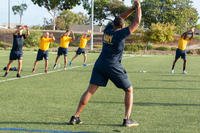We all tend to fall into a rhythm with exercising and have our own preferences for how and when we train. If you are focusing on military service in your future, it is not a bad idea to start building a habit of training first thing in the morning, as that is when most group PT and runs will take place.
However, many military members also will do supplemental workouts, such as squeezing in quick workouts during lunch like a swim, run or even a yoga class or getting a heavier lift or longer cardio event in the evenings.
Here is a question from someone who mixes up their training cycles with a variety of activities, but also trains throughout the day:
Stew -- Longtime reader! As I have aged post-military career, I have found I still enjoy some form of pre-work activity now with my civilian job. I like a lot of what you recommend with calisthenics and cardio mixed in the morning for about 30-45 minutes to wake up, but I also get either a lift or your mobility session in during the day or evening. I am not sure if I should be doing this much or how long I can keep it up, but I feel great at 48 and am still a productive member in my office. Any recommendations to training schedules? More variety? Anything I am missing? Thanks - Jackson.
Jackson, thanks for the note and your prior service. You are doing so much right that I do not want to make any suggestions that would mess up your training methods -- good job. I find I also need a pre-work workout (usually, run, calisthenics, some lifts), and I am most productive and creative at work by starting fresh at 8 a.m. and going through noon. I need to do less creative work after lunch like administrative duties, so I take a break to go for a walk and do some pull-ups or squats to help stay alert. After work, I tend to focus more on cardio or yoga-based stretching, though some days I will lift for 20-30 minutes.
I let my schedule decide what I need to do for that evening training cycle. If I need to continue doing work or stay up later, I will lift as it revs up my energy for the next few hours. However, if my day is done and I feel like I just need to relax and unwind, I will do some light cardio and stretching. This helps me metabolize some of the day’s stress and allows my head to clear before bed, resulting in a better night’s sleep.
But don’t take my word for it. I recently found this survey created by FitRated who interviewed 1,000 full-time professionals to learn more about how exercise impacts their work lives. Here are some of what they found:
-- According to more than nine in 10 professionals, exercising before work most optimally benefits energy (94%), focus (93%) and productivity (93%).
-- Those who exercise in the morning say yoga is best for focus, weightlifting for productivity and energy and treadmill running for creativity and problem-solving.
-- Professionals who exercise before work are most likely to avoid the “afternoon slump” (20%).
-- Less than half of professionals who don’t exercise during the week feel creative during the workday and/or find it easy to problem-solve quickly.
-- Employees who exercise during a short work break are more likely to be relaxed at work.
My advice is to keep doing what you are doing, but keep adding variety and make your secondary training sessions dependent on what your day is like. If highly stressed, work it off with some easy cardio and yoga stretching. If you need to continue to work late or have a night shift, get in a lift shortly after a light but nutritious dinner so you will be more energized during a period that usually sends the mind and body into rest and digest mode.
There is nothing wrong with an evening lift if you need to complement your morning workouts, just try to avoid doing it too close to bedtime as it can be difficult to sleep after a higher-intensity workout. In a nutshell, I run and swim, mixed with calisthenics, to wake up and lift to stay awake, but stretch and breathe to decompress when needed.
According to the FitRated survey, yoga was a fan favorite for the after-work exercise. Many felt that yoga was the most effective way to increase focus, productivity, energy levels and creativity.
Equally useful was outdoor running or jogging as the best way to sharpen people’s problem-solving skills either before or after work. Consider engaging the parasympathetic nervous system after a long day of focusing at work. Simply move and breathe more by walking, jogging, using an elliptical machine or doing yoga. Yoga will help especially with stress hormones by altering the brain chemistry though mindfulness techniques and breathing exercises into its practice. It’s a fantastic way to press the reset button on your mind at the end of the day or any time when feeling sluggish.
Stew Smith is a former Navy SEAL and fitness author certified as a Strength and Conditioning Specialist (CSCS) with the National Strength and Conditioning Association. Visit his Fitness eBook store if you’re looking to start a workout program to create a healthy lifestyle. Send your fitness questions to stew@stewsmith.com.
Want to Learn More About Military Life?
Whether you're thinking of joining the military, looking for fitness and basic training tips, or keeping up with military life and benefits, Military.com has you covered. Subscribe to Military.com to have military news, updates and resources delivered directly to your inbox.















